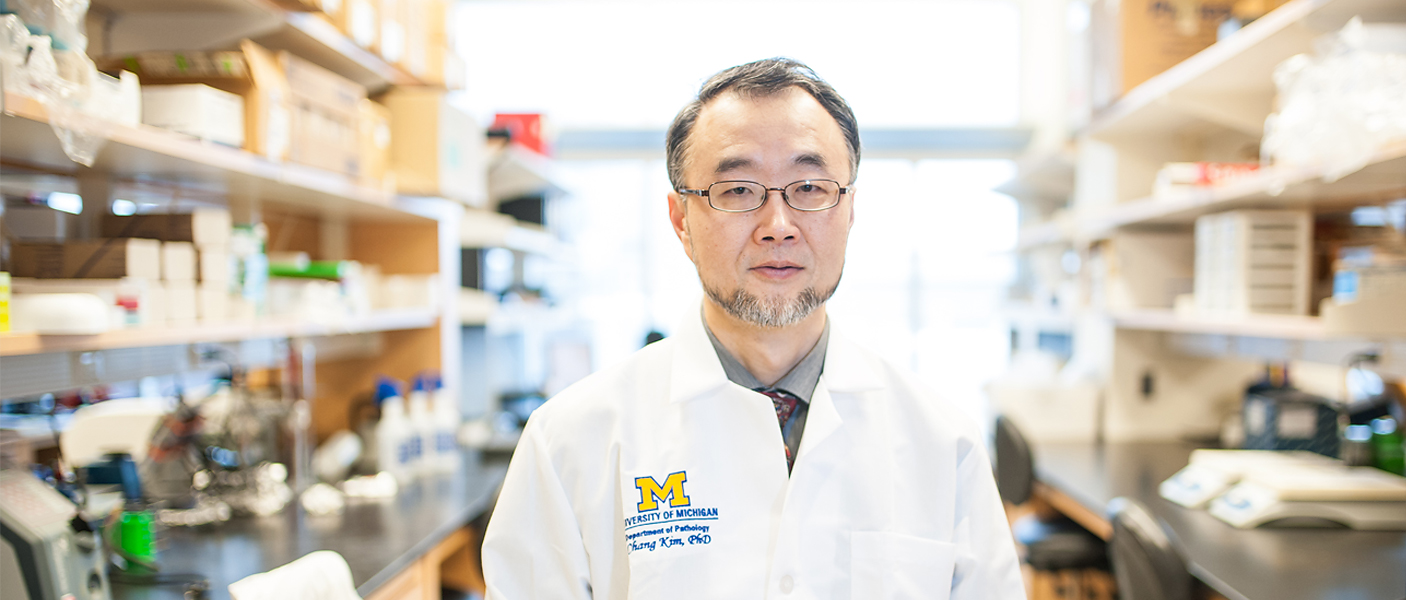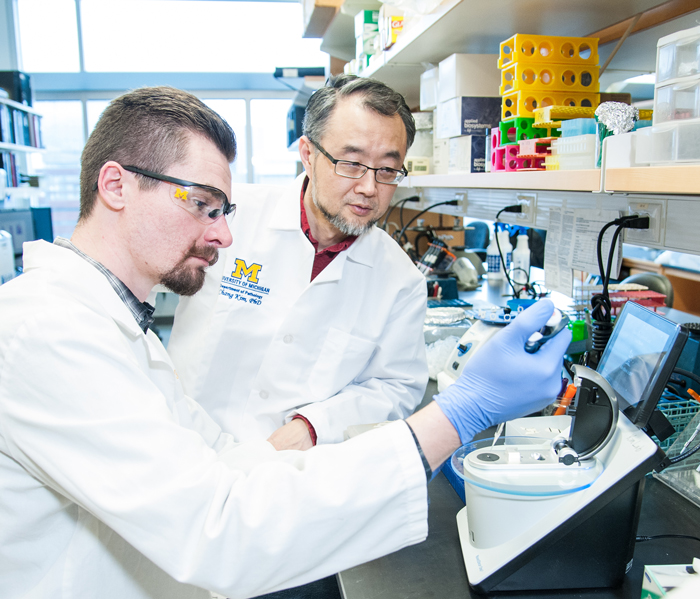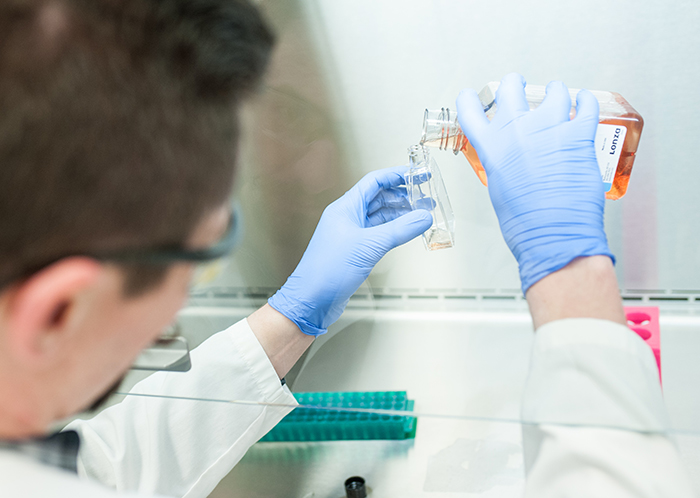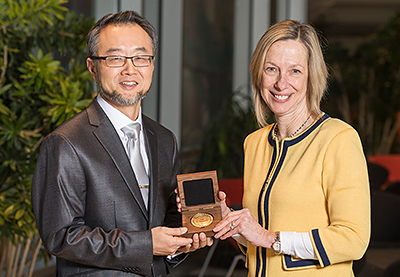

 Dr. Chang Kim with graduate student Leon Friesen.Chang Kim, PhD likens his philosophy of science to building a house. While he can’t build a whole house, he can add an important part, one brick at a time, with his colleagues. As Professor of Pathology, Inflammation, and Immunology, and the newest member of the Division of Experimental Pathology, he plans to do just that.
Dr. Chang Kim with graduate student Leon Friesen.Chang Kim, PhD likens his philosophy of science to building a house. While he can’t build a whole house, he can add an important part, one brick at a time, with his colleagues. As Professor of Pathology, Inflammation, and Immunology, and the newest member of the Division of Experimental Pathology, he plans to do just that.
As a child in An-Sun, South Korea, Kim’s curiosity of the working mechanisms of objects and nature resulted in a love for science, which led him to study molecular biology. He earned his bachelor’s and master’s degrees from the Korea Advanced Institute of Science and Technology in 1990.
After working in the biotech branch of LG Chem, Ltd, he pursued his doctorate at the Indiana University School of Medicine in 1995. There, he worked with his mentor, and pioneer in cord blood stem cell biology and transplantation, Hal Broxmeyer, PhD. Kim followed his time at Indiana with a postdoctoral fellowship at Stanford. His work there was devoted to a T helper subset which lives in the germinal centers of lymphoid tissues and aids in B cell differentiation.
Having been cited over 10,000 times, and published over 100 papers, Kim is world-renowned in lymphocyte biology and mucosal immunology. At Purdue University, where he spent the past 16 years, he was the section head of microbiology, immunology, and molecular genetics and the program leader of the Institute of Inflammation, Immunology, and Infectious Diseases. His team studied the role of nuclear hormone receptor ligands, such as progesterone, and made many discoveries establishing the roles of retinoic acid in immunity and immune tolerance.
Kim believes his move from Purdue to U-M will allow him to take his research to the next level. “To understand the immune response behind food allergy, and how to cure and prevent it, is the mission of our research now. The environment here is wonderful. It’s a world-class environment in research with world-class colleagues,” he says.
 While Kim’s academic home at U-M is the Department of Pathology, he will conduct his research through both the Department of Pathology and the Mary H. Weiser Food Allergy Center. Nick Lukacs, PhD, the Godfrey Dorr Stobbe Professor of Pathology, Inflammation, and Immunology and Scientific Director of the Food Allergy Center, worked to recruit Kim to U-M. “We’re very fortunate to recruit Dr. Kim. His research expertise will complement the Food Allergy Center’s research effort to identify how the disease develops, and how new treatments and cures can be identified. It’s also perfect for contributing to the Department of Pathology and its efforts in mucosal intestinal immune responses in Inflammatory Bowel Disease and other immunologic mucosal diseases,” Lukacs says.
While Kim’s academic home at U-M is the Department of Pathology, he will conduct his research through both the Department of Pathology and the Mary H. Weiser Food Allergy Center. Nick Lukacs, PhD, the Godfrey Dorr Stobbe Professor of Pathology, Inflammation, and Immunology and Scientific Director of the Food Allergy Center, worked to recruit Kim to U-M. “We’re very fortunate to recruit Dr. Kim. His research expertise will complement the Food Allergy Center’s research effort to identify how the disease develops, and how new treatments and cures can be identified. It’s also perfect for contributing to the Department of Pathology and its efforts in mucosal intestinal immune responses in Inflammatory Bowel Disease and other immunologic mucosal diseases,” Lukacs says.
An endowment from the Kenneth and Judy Betz family will help propel Kim’s work, as he has been installed as the inaugural Kenneth and Judy Betz Family Research Professor in Food Allergy Research. Contributors to U-M’s engineering, law, athletics, and Michigan Medicine funds, the Betz family became interested in allergy research when their granddaughter, Alexa, became severely ill after eating ice cream while on vacation. Several other adverse reactions to food led to testing at the Food Allergy Center and a diagnosis of allergies to eggs and many other foods.
Moved by the care that Alexa received at the Center, the family invested in supporting those researching food allergies, in order to better understand the disease and, hopefully, lead to better treatment and a cure. “Our experience at Michigan has been incredible, and I think of Michigan as leading the nation in every endeavor,” says Kenneth Betz. “They don’t ever sit back and just let other institutions do the work. There is no other place where you will get a bigger bang for the dollars you contribute.”
Kim says the gift from the Betz family will provide him energy to study how lymphocyte cells in the immune system function and how they migrate. His team will also work to learn how metabolites produced by the 1000 different types of bacteria in the gut regulate the immune cell, and how that affects food allergy response.
In addition to working, and making improvements to the home he and his wife just purchased, Kim looks forward to canoeing on the Huron River and playing golf when the weather improves. “Golf I can say gives me peaceful energy. You see green, an open space. The ball doesn't listen to me,” he continues, “research is the same thing. Actually, 50% of the time, it's different.” He goes on to explain that he considers that a great opportunity because it is nature showing itself. It’s just different than your expectation and a reminder that there’s more to learn.
Kim’s first year at U-M will be spent completing the regulatory approvals required to get his lab up and running at Michigan, along with recruiting more team members. He’ll also work on interacting with research groups in Pathology, The Food Allergy Center, and campus-wide immunology groups to learn about resources and expertise available for collaboration. “They are trying a jigsaw puzzle, trying to find the missing pieces in their research. We’re coming here to fill that little void in research to make the picture complete,” Kim says.
—
 |
||
First Kenneth and Judy Betz Family Research ProfessorThe installation of Chang Kim, PhD as the first Kenneth and Judy Betz Family Research Professor in the University of Michigan Medical School was held on Tuesday, January 23rd at the D. Dan and Betty Kahn Auditorium in the A. Alfred Taubman Biomedical Science Research Building. Read About Event |
||
 ON THE COVER
ON THE COVER
Breast team reviewing a patient's slide. (From left to right) Ghassan Allo, Fellow; Laura Walters, Clinical Lecturer; Celina Kleer, Professor. See Article 2014Department Chair |

newsletter
INSIDE PATHOLOGYAbout Our NewsletterInside Pathology is an newsletter published by the Chairman's Office to bring news and updates from inside the department's research and to become familiar with those leading it. It is our hope that those who read it will enjoy hearing about those new and familiar, and perhaps help in furthering our research. CONTENTS
|
 ON THE COVER
ON THE COVER
Autopsy Technician draws blood while working in the Wayne County morgue. See Article 2016Department Chair |

newsletter
INSIDE PATHOLOGYAbout Our NewsletterInside Pathology is an newsletter published by the Chairman's Office to bring news and updates from inside the department's research and to become familiar with those leading it. It is our hope that those who read it will enjoy hearing about those new and familiar, and perhaps help in furthering our research. CONTENTS
|
 ON THE COVER
ON THE COVER
Dr. Sriram Venneti, MD, PhD and Postdoctoral Fellow, Chan Chung, PhD investigate pediatric brain cancer. See Article 2017Department Chair |

newsletter
INSIDE PATHOLOGYAbout Our NewsletterInside Pathology is an newsletter published by the Chairman's Office to bring news and updates from inside the department's research and to become familiar with those leading it. It is our hope that those who read it will enjoy hearing about those new and familiar, and perhaps help in furthering our research. CONTENTS
|
 ON THE COVER
ON THE COVER
Director of the Neuropathology Fellowship, Dr. Sandra Camelo-Piragua serves on the Patient and Family Advisory Council. 2018Department Chair |

newsletter
INSIDE PATHOLOGYAbout Our NewsletterInside Pathology is an newsletter published by the Chairman's Office to bring news and updates from inside the department's research and to become familiar with those leading it. It is our hope that those who read it will enjoy hearing about those new and familiar, and perhaps help in furthering our research. CONTENTS
|
 ON THE COVER
ON THE COVER
Residents Ashley Bradt (left) and William Perry work at a multi-headed scope in our new facility. 2019Department Chair |

newsletter
INSIDE PATHOLOGYAbout Our NewsletterInside Pathology is an newsletter published by the Chairman's Office to bring news and updates from inside the department's research and to become familiar with those leading it. It is our hope that those who read it will enjoy hearing about those new and familiar, and perhaps help in furthering our research. CONTENTS
|
 ON THE COVER
ON THE COVER
Dr. Kristine Konopka (right) instructing residents while using a multi-headed microscope. 2020Department Chair |

newsletter
INSIDE PATHOLOGYAbout Our NewsletterInside Pathology is an newsletter published by the Chairman's Office to bring news and updates from inside the department's research and to become familiar with those leading it. It is our hope that those who read it will enjoy hearing about those new and familiar, and perhaps help in furthering our research. CONTENTS
|
 ON THE COVER
ON THE COVER
Patient specimens poised for COVID-19 PCR testing. 2021Department Chair |

newsletter
INSIDE PATHOLOGYAbout Our NewsletterInside Pathology is an newsletter published by the Chairman's Office to bring news and updates from inside the department's research and to become familiar with those leading it. It is our hope that those who read it will enjoy hearing about those new and familiar, and perhaps help in furthering our research. CONTENTS
|
 ON THE COVER
ON THE COVER
Dr. Pantanowitz demonstrates using machine learning in analyzing slides. 2022Department Chair |

newsletter
INSIDE PATHOLOGYAbout Our NewsletterInside Pathology is an newsletter published by the Chairman's Office to bring news and updates from inside the department's research and to become familiar with those leading it. It is our hope that those who read it will enjoy hearing about those new and familiar, and perhaps help in furthering our research. CONTENTS
|
 ON THE COVER
ON THE COVER
(Left to Right) Drs. Angela Wu, Laura Lamps, and Maria Westerhoff. 2023Department Chair |

newsletter
INSIDE PATHOLOGYAbout Our NewsletterInside Pathology is an newsletter published by the Chairman's Office to bring news and updates from inside the department's research and to become familiar with those leading it. It is our hope that those who read it will enjoy hearing about those new and familiar, and perhaps help in furthering our research. CONTENTS
|

MLabs, established in 1985, functions as a portal to provide pathologists, hospitals. and other reference laboratories access to the faculty, staff and laboratories of the University of Michigan Health System’s Department of Pathology. MLabs is a recognized leader for advanced molecular diagnostic testing, helpful consultants and exceptional customer service.